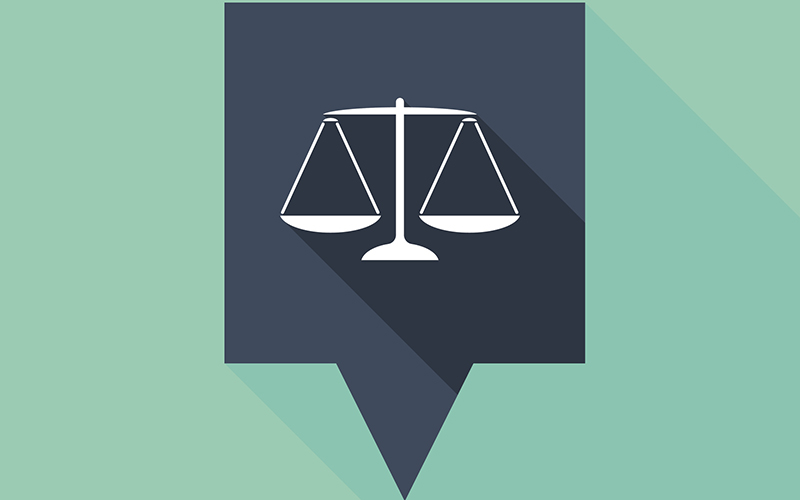Taking the Stand
CPAs have important roles to play in patent infringement trials and settlements.
By Scott D. Hampton, CPA, ABV, CFF | Digital Exclusive - 2017

In high-stakes litigation, trial attorneys often use expert witnesses to address the magnitude of monetary remedies. A qualified expert witness is someone who has the knowledge, skill, education, or training in a specialized field—like accounting—that can help the jury or court understand the evidence or establish a fact at issue.
Expert witnesses form opinions by collecting, testing, and evaluating evidence, and then communicate those opinions at deposition or trial. It likely comes as no surprise that certified public accountants (CPAs) are frequently called on as expert witnesses to testify in complex patent infringement litigation as a consequence of their financial accounting training, general business knowledge, analytical skills, and valuation experience. In fact, their testimony can play a significant role in the outcome of a settlement or trial.
Consider the case of a reasonable-royalty award for patent infringement, where it’s critical to determine the value of what was taken from the patent owner by means of infringement, or if a prior settlement of litigation agreements should be admissible in court.
Courts have long struggled with the admissibility of agreements used to settle earlier patent litigation when considering patent infringement damages. CPAs acting as expert witnesses should understand the evidence courts consider when weighing this decision.
The U.S. Court of Appeals for the Federal Circuit’s recent opinion in
Prism Technologies LLC v. Sprint Spectrum L.P. DBA Sprint PCS clarifies current judicial thinking on such agreements in the determination of reasonable-royalty damage awards.
Owners of utility patents have the right to exclude others (through litigation) from making and using a patented invention for a limited period of time. By their very nature, non-exclusive patent licenses presuppose a covenant not to sue. When infringed, patents confer a right to call on the courts for redress. Therefore, the potential for litigation hangs over most patent licenses, including settlement agreements negotiated outside the bounds of a filed lawsuit.
From a lay perspective, courts may exclude a settlement agreement if its probative value is substantially outweighed by a danger of one or more of the following: unfair prejudice, confusing the issues, misleading the jury, undue delay, wasting time, or needlessly presenting cumulative evidence.
With regard to settlement agreements, the Supreme Court has previously stated: “Most defendants are unlikely to settle unless the cost of the predicted judgment, discounted by its probability, plus the transaction costs of further litigation, are greater than the cost of the settlement package. If fee waivers cannot be negotiated, the settlement package must either contain an attorney’s fee component…, or else the parties must agree to have the fee fixed by the court.” CPAs should take note; this normal settlement calculus—“the cost of the predicted judgment,” “its probability,” and “costs of further litigation”—helps courts identify why and when they should consider settlement agreements in valuing patent damages.
A settlement involving a patented technology can also be an indicator of the technology’s value if the patent’s value was at issue. Of course, prior litigation needs to have explored the patent’s value, before the parties settled, if the settlement agreement is to be deemed relevant in subsequent litigation.
To that point, a settlement amount may have been negotiated too low or too high, relative to the value of the patented technology at issue, for a variety of reasons, such as risk avoidance, merits of the case, relationship and attributes of the litigating parties, and continuing litigation expense.
For example, a settlement may be too low, if a patent owner discounts a technology’s value out of fear of losing the case based on poor advocacy, lack of funds, or problems getting evidence admitted. On the other hand, a prior settlement may be seen as too high when it includes technology that isn’t part of the subject lawsuit; when the magnitude of the earlier infringement was broader than in the current case; when the scope of the license conveyed encompassed superior rights, or when physical inventory or other assets, both tangible and intangible, were transferred with the patented technology in the earlier lawsuit but not in the later lawsuit. The degree of willfulness (or lack thereof) may also have influenced the amount for which the patent owner settled an earlier litigation.
Whether a settlement agreement is admitted or not depends on many elements, including, but not limited to, the technology transferred; the parties’ commercial relationship and relative size; the scope of the license granted in the settlement agreement, including exclusivity, type of royalty, duration of the license, scope of use, and royalty base; the risk of enhanced damages due to willful infringement; how far along the litigation was when the parties settled; the probability of the patent owner winning on the merits; the number of earlier settlement agreements for the same patented technology; and the availability of evidence useful to apportion the settlement value to the patent-in-suit, particularly when the settlement agreement included patents other than the patent-in-suit.
In summary, a prior settlement agreement may be admissible when: (i) the same patent is at issue in the settlement agreement and the subject litigation; (ii) the settlement occurred late in the litigation after full discovery and argument at trial; (iii) there were no enhanced damages at issue; and (iv) there are similarities between the prior and the subject litigation.
CPAs play critical roles as expert witnesses. As trusted business advisors to their clients, and the public, CPAs must understand the rules of evidence and settlement calculus to be prepared to assist their clients in arguing for, or against, the admission of prior litigation settlements.
Scott D. Hampton, CPA, ABV, CFF is the owner of Hampton IP & Economic Consultants LLC. He can be reached at 801-328-9888.